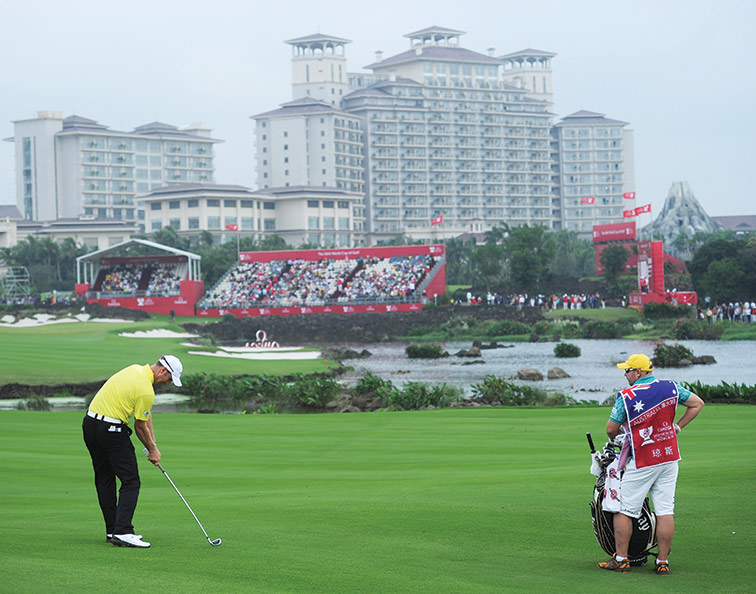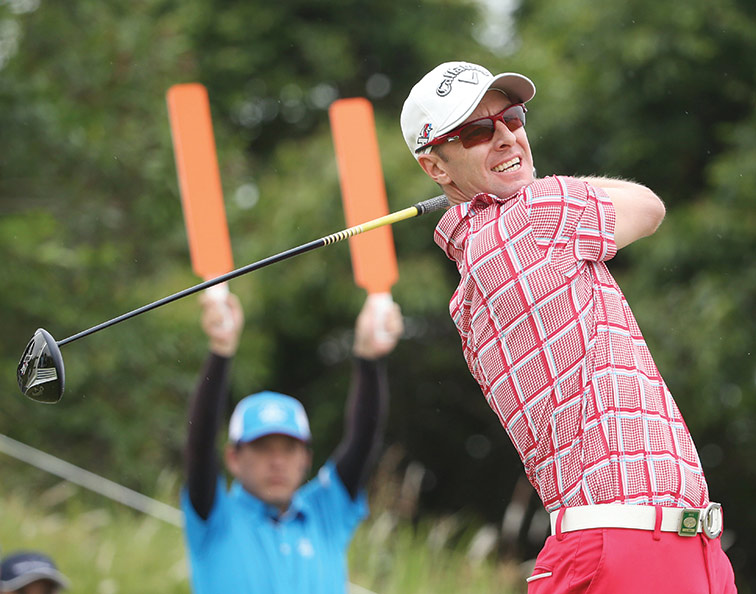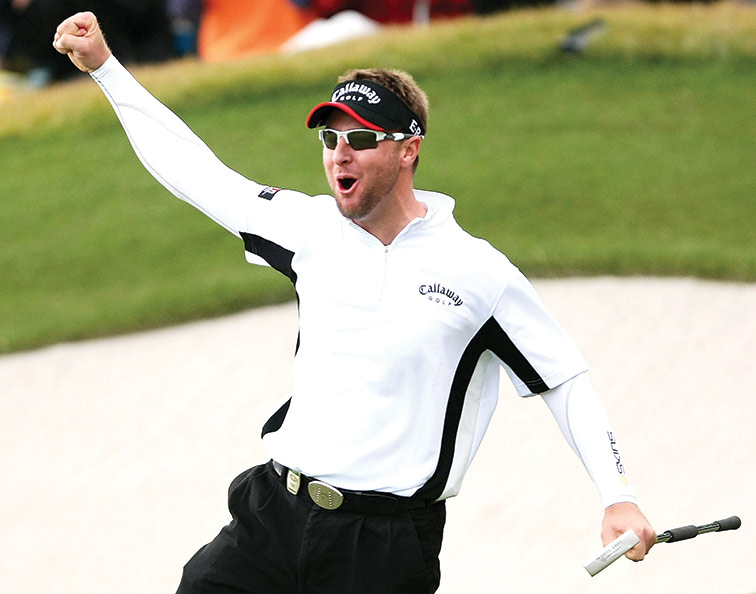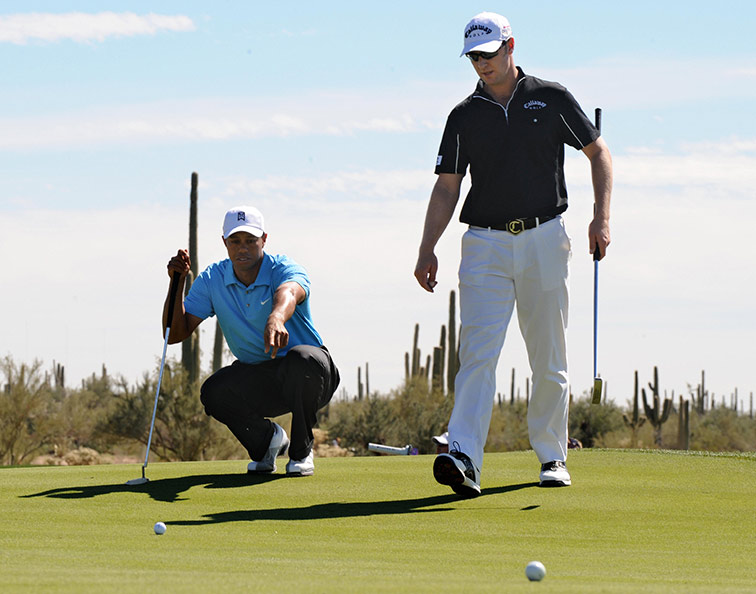TO MANY international golf fans, Brendan Jones is the guy who lost to Tiger Woods at the World Golf Championships–Accenture Match Play in 2009. But, in Australia, the 41-year-old is better known as the guy who has conquered golf in Japan like no other.
Jones has played on and off in Japan since 2000, amassing 14 Japan Golf Tour victories, and with his career earnings there alone approaching ¥1 billion, he is the highest-earning foreign player in the tour’s history.
Yet the Japanese circuit is an enigma to much of the western golf world.
Its tournaments are almost never televised in Australia, few players from outside Japan or Korea play there – and even fewer international media – which makes Jones’ success story somewhat untold.
“There’s no information coming out of here; the Japan Tour don’t actively put it out to the rest of the world,” Jones says. “I’ve just embraced Japan, embraced the culture and haven’t let things that bother other people get to me.
“The language annoys a lot of people, frustrates a lot of people and if you don’t accept that then it’s going to be a long, hard time for you up here. I love the food and travel is so easy. I’m happy here and I’ve always felt like one of the better players.”

The Canberran remembers when his coach, Alex Mercer, persuaded him to try Japan. “I’d just won the [1999] Australian Amateur, had a relatively successful first stint on the Australasian Tour. He just said, ‘You’re good but you’re not ready for the (US) PGA Tour. How about you try Japan?’
“I didn’t know anything when I first came here; I went to Q-school and I was paying something like $200 from my hotel to the golf course in a taxi every day and that was because I didn’t know I could rent a car.”
Jones’ victory in September at the ANA Open gave him full status in Japan until the end of 2018 and resurrected a season that had, until then, yielded just one top-10.
It ended a drought of more than three years, was his first win following a pair of wrist surgeries in 2013 and ’14 and since switching from a broomstick to a short putter.
“I’ve had all these doubts that maybe 13 times is as many tournaments as I’m going to win up here.
“It’s been a pretty frustrating two-and-a-half years. When you’re out of the game, the game doesn’t stop for you. That’s been the big thing – just struggling with playing with people [who] have no right to be beating me week after week. I never thought about giving the game away but it’s just so hard when you’ve been so good for a long time and then, all of a sudden, it’s not there.”

Jones had been a model of consistency in the years leading up to his wrist surgeries.
From his first full season in 2001 until 2012, he finished inside the top-10 on the moneylist seven times, including a three-win season in 2007 when he ended the year as the tour’s third-highest earner.
“I’ve done things a lot differently to other people; I haven’t worked at my game as hard as 98 per cent of the people out there,” Jones says. “I’ve got to a point through a lot of natural ability and, I think, thinking clearly.”
When he finishes a round, Jones rarely grinds at his game on the practice fairway. In Japan, almost every golf club has an onsen – a traditional Japanese communal bath – and it’s where you’ll find the tour veteran on a near daily basis.

conquered Japan.
“I’ll go to an onsen where I’ll have a sauna. I’ll sweat for 10 or 15 minutes and then sit in a cold bath for a couple of minutes. If I want another sweat, I’ll do it again. You feel incredible. When I go home, it’s probably the biggest thing that I miss about [Japan].”
But there’s no sense of regret when Jones reflects on his only full season on the US PGA Tour in 2005, when he finished 144th on the moneylist and failed to keep his card.
“When I went to the US, I changed everything; I practised more and I played more and it just didn’t work for me. Up here, I play my 20 tournaments a year and I have my nice little breaks throughout.
“In hindsight, what makes me play the best is by doing what I do – not practising or playing as much, staying fresh and I think if I could go back to 2005, that’s what I would have done.”
Jones came under golf’s global spotlight in 2009 when – as the 64th-ranked player in the world – he faced Woods in the first round of the WGC–Match Play.
“Playing Tiger was probably one of the most memorable things I’ll look back upon because he’d just come back from his knee surgery. It was one of the biggest comebacks of all time and there’s this bloke that no one had ever heard of playing him. No one knew me in the media centre. I lost 3&2 to him but didn’t disgrace myself.”
Jones is candid in revealing golf for him is not the life-defining passion it is for some touring pros. In his off-season, he goes home to Canberra, opting not to touch a club from December to March. Instead, he spends his leisure time road cycling.

But he did break his summer ‘no practise’ rule in 2011 when he found out he was to play Phil Mickelson in the first round of the WGC–Match Play.
“I hadn’t touched a club for six or eight weeks and I thought, Now I’ve got to practise. I didn’t want to because I never feel like practising when I’ve had a lot of time off. I just think, Oh, it’s back to work.”
Jones has played in every major championship except the Masters and says getting an invite to Augusta National is no longer a priority.
“I’ve finished 51 or 52 [on the world rankings] a couple of times and the top 50 normally get invited. I’m more realistic these days and sort of think that ship has sailed. If it never happens, it never happens and I’m not going to lose any sleep over it.”
As a junior, Jones saw himself one day becoming a top-10 player in the world. But his time in Japan has taught him the advantages of an enjoyable work/life balance and a lifestyle he values more than becoming a household name in the US.
“For as long as I’ve been up here, I’ve told everyone that would listen how good this place is. But a lot of the kids these days seem hell-bent on going straight to the US or Europe, which I don’t have an issue with. Good luck to them, but not everyone’s going to be a Greg Norman or an Adam Scott or a Jason Day.”



